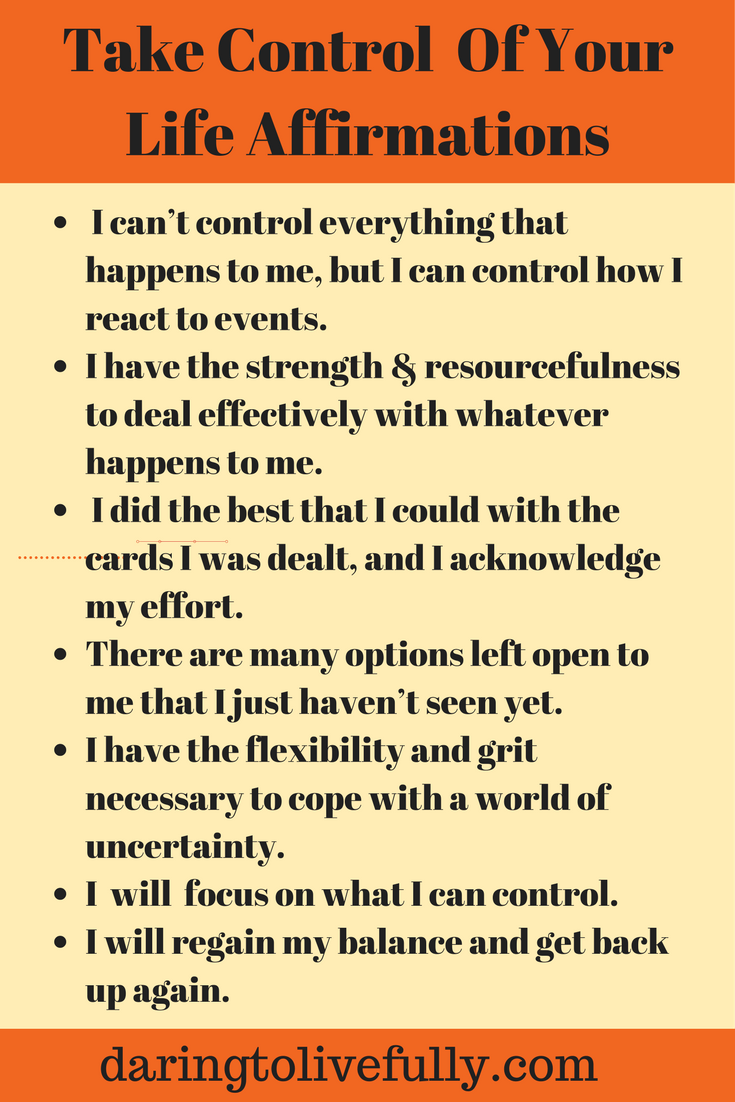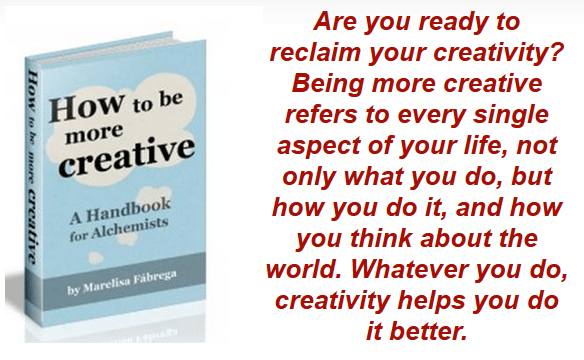
Although we live in a complicated world filled with uncertainty, there are things you can do to take control of your life.
The fact is that there are more things outside of your control than there are within your control. This knowledge can cause a myriad of negative feelings, such as anxiety, fear, and even helplessness. After all, it can be unsettling to realize just how much of life is uncertain and uncontrollable.
Here are just some examples of things that you can’t control:

- What anyone around you does (not even the people closest to you).
- The economy.
- The weather, including natural disasters.
- World events, or what politicians do.
- The traffic.
- The stock market or interest rates.
- Inflation.
- The fact that you may have inherited a predisposition to certain diseases and illnesses (both physical and mental).
And the list goes on and on.
However, there are things you can do to better manage the fact that there is so much over which you have little or no control. Below you’ll find 10 tips that will allow you to take control of your life in an uncertain world.
Step 1. Set Goals
Take control of your life by setting goals. Setting goals will do all of the following for you:
- Allow you to clarify what you want in life.
- Provide a target for you to shoot at.
- Allow you to create a life governed–as much as possible–by your own choices.
Think of it this way: although there are many things outside of your control, there are some things within your circle of influence. This includes your assets and resources, such as your time, money, attention, and so on.
Setting goals is a mechanism that will allow you to manage those things that are within your control in a way that will allow you to create the kind of life you want, even in an uncertain world.
2. Practice Prevention
You can reduce some of the uncertainty in your life–and put more of what happens to you within your control—by practicing prevention. Prevention, in a nutshell, is putting up safeguards that will reduce the probability that something that you don’t want to happen will take place.
Here are some examples:
- You don’t want to get sick, so you eat healthy meals most of the time, and get regular exercise. This doesn’t guarantee that you won’t get sick, but it does reduce your risk of contracting certain diseases.
- You don’t want your car to break down in the middle of the road, so you take it in for regular tune ups. This doesn’t guarantee that your car won’t break down in the middle of the road, but it does lessen the probability that this will happen.
- You don’t want a thief to break into your house, so you put bars on your windows. This doesn’t provide 100% assurance that a thief won’t break into your house, but it is a hindrance that makes it less likely that your house will be robbed.
Take control of your life by taking steps that will lessen the probablity that bad things will happen to you.
At the same time, don’t take action that will make it more likely that the things you don’t want to happen will take place. Here are some examples:
- If you don’t want to get lung cancer, don’t smoke.
- If you don’t want to be in a car accident, don’t speed, and don’t talk on your phone while driving.
- If you don’t want to get mugged, don’t walk alone at night in the bad part of town.
You can take control of your life by thinking of the things that you don’t want to happen, and then acting in a way that makes it less likely that those things will happen.
3. Be Prepared for the Unexpected
There’s a 1785 poem by the Scottish poet Robert Burns titled, “To a Mouse”, which contains the following phrase: “The best laid plans of mice and men, often go awry”. Even if you’ve come up with a great plan for getting to where you want to go, things can still go wrong. However, all is not lost. . . if you’re prepared.
You can take steps ahead of time to be prepared in case something unwanted takes place. That is, you can take control of your life by preparing for the unexpected.
As an illustration, a few months ago my laptop died, out of the blue. I didn’t do anything to it—like dropping it or getting it wet—, it just. . . died, without warning. I make a living online, so not having a computer is a really bad thing for me.
Nonetheless, because I know that computers tend to malfunction, and simply stop working at the most inconvenient moments, I was prepared. I had an envelope stashed away with money inside for this exact eventuality.
Therefore—after being told by the computer repair guy that there was no way to salvage my laptop–, instead of panicking, I simply did the following:
- I grabbed my envelope;
- I headed on over to the mall; and
- I bought myself a new laptop.
The crisis was averted, and I was able to quickly restore order to my world, because I was prepared.
Here are some other ways to prepare for the unexpected:
- Take out insurance.
- Give yourself a time cushion for important events: leave early for important meetings; include time to deal with unexpected events when you calculate how long an important project will take to complete; and so on.
- Keep an extra shirt at work in case you spill something on yourself.
- Always keep a spare tire—in good condition–, along with a tire jack and tire iron, in the trunk of your car.
- Build a stash of anything that’s important to your wellbeing.
- Create safety net containing six months’ worth of living expenses.
- Keep a fire extinguisher in your home, and have a home fire escape plan.
Being prepared allows you to regain control quickly and effectively if something goes wrong. It allows you to retake control of your life after something unexpected has taken place.
4. Practice Acceptance
Anytime your plans are thwarted, practice acceptance. Acceptance is perceiving an experience and acknowledging it, without judgement or resistance. After all, judging or resisting an event or situation won’t change it, and it won’t help you to deal with it. It will simply cause you suffering.
At the same time, acceptance doesn’t mean resignation. Once you’ve accepted something, you’re no longer wasting your time and energy negating it, or fighting against it. Instead, you’ve put yourself in the best possible position to begin planning your next move, so you can begin to influence the event or situation.
Take control of your life by practicing acceptance.
5. Choose Your Story Carefully
More and more I’ve come to realize the importance of the stories that we tell ourselves about what’s going on around us. After all, what happens in the outside world isn’t really what matters. Instead, what matters is what we choose to tell ourselves about what happened.
Once an unexpected event has taken place, and you’ve accepted what happened, the next step is to be careful with the story that choose to tell yourself about what took place. This is important because the story you tell yourself can either empower you, or disempower you.
Make sure that the story you tell yourself is in line with the facts, and that it does the following:
- Keeps you in the driver’s seat—don’t tell yourself a victim story.
- Allows you to acknowledge any mistakes you made so that you can learn from those mistakes.
- Give you options to move forward.
Also, take control of your life by keeping in mind that just because things veered off course, that doesn’t mean the story is over. The story can still have a happy ending, depending on what you choose to do next.
6. Choose Your Attitude
I wrote in the previous point that when something unexpected happens, you should be careful with the story that you choose to tell yourself about what happened. In addition to the story that you tell yourself, something else that’s under your control is the attitude that you choose to have.
Ask yourself:
- What do I want to happen here?
- What attitude would be the most helpful in helping me to achieve what I want?
Then, choose that attitude. Take control of your life by always choosing the attitude that is most likely to help you create the kind of life that you want.
7. Come Up With a Different Plan
When something doesn’t go as planned, simply assess the situation, and then come up with a different plan. That is, adapt.
Even when the things that you thought would happen don’t happen, there are steps you can take to influence what happens next. Start generating alternatives, evaluate those alternatives, pick one, and get to work on carrying it out.
8. Stop Waiting For Other People
A lot of the time things feel out of control because of other people. They act in ways you disagree with, or they fail to do the things you feel should be done. The bottom line is that there’s nothing you can do to control other people. But you can always control yourself.
To take control of your life, take back the decision-making power when the action or inaction of others is making you feel helpless, angry, or frustrated. As an illustration, suppose that you want to move up the ladder at work. You do everything you can to turn yourself into the ideal employee:
- You perform your duties well, and even go above and beyond what’s expected of you.
- You devote one-hour-a-day to keep your job skills updated.
- You anticipate your boss’s needs and make him look good to the higher ups.
Nonetheless, you’ve been stuck in the same position for a long time, and you’ve finally realized that this isn’t going to change. That’s when you decide to stop waiting for your boss to offer you a promotion, and you take things into your own hands.
Here are some of the things you can do:
- Try to move up by asking for a transfer to a different department of your company where you’ll have a better boss or more opportunities.
- Start applying for a better position at another company.
- Start a side business and begin preparing to quit your job as soon as your business starts doing well.
Here are some more examples of how you can take control by taking the decision out of the hands of others:
- Stop waiting for someone to publish your book. Instead, self-publish it.
- Stop waiting for your city’s government to clean up the beach. Grab some trash bags and some friends, and start cleaning it yourself.
- Stop waiting for a business school to accept you. Read the best business books you can find and start applying what you learn from those books.
The more decisions you take out of the hands of others, and put into your own hands, the more control you’ll have over what happens next.
9. Make a List of Things You Can Control
Even if there’s absolutely nothing you can do about a specific situation—at least in the present moment—there are many things in your life that are still within your control. Focusing on what is within your control will help to restore a sense of order in your life.
Place your attention on those things that are within your control by making a list of those things. Here are some examples of things that you can put on your list:
- Cook yourself a healthy, delicious meal.
- Choose to be kind to yourself and practice self-care.
- Practice a hobby you’re good at, such as playing the piano, drawing, or doing some woodwork. You can also practice a sport you enjoy.
- Declutter and organize your closet. Donate the stuff that is still wearable, but that you no longer use, to Goodwill.
Focusing on things you can control will allow you to restore a sense of your own self-efficacy, which is often eroded when you feel as if you have little say in what happens to you.
10. Reduce Your Anxiety With Positive Self-Talk
One of the feelings that often accompany an event that makes you feel as if things are out of your control is anxiety. When I begin to feel anxious because something isn’t going as planned—despite my best efforts—I lessen the anxiety that I feel by repeating some positive affirmations to myself.
Here are the affirmations I use:

Conclusion
Apply the 10 tips above and take control of your life. Live your best life by dealing effectively with a world filled with uncertainty.





Related Posts:




 Marelisa Fabrega is a lawyer and entrepreneur. She holds a Bachelor of Science in Business Administration from Georgetown University in Washington, D.C., as well as a Juris Doctor from the Georgetown University Law Center. You can learn more about her
Marelisa Fabrega is a lawyer and entrepreneur. She holds a Bachelor of Science in Business Administration from Georgetown University in Washington, D.C., as well as a Juris Doctor from the Georgetown University Law Center. You can learn more about her 





